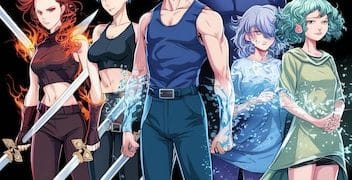Unmasking the Villains: A Deep Dive into J-Drama Antagonists

Unmasking the Villains: A Psychological Exploration of Antagonists in J-Dramas delves into the complex motivations, fears, and societal influences that shape these characters, offering a unique perspective on their roles within the narrative landscape of Japanese dramas.
Japanese dramas, or J-dramas, are not just about the endearing protagonists; the villains play a crucial role in shaping the narrative, adding depth and intrigue to the storyline. Unmasking the Villains: A Psychological Exploration of Antagonists in J-Dramas reveals the motivations, complexities, and sometimes, the surprisingly human elements within these characters that make J-dramas so compelling.
The Allure of the J-Drama Antagonist
Why are we so fascinated by villains? Is it their uninhibited nature, their defiance of societal norms, or the dark mirror they hold up to our own potential flaws? In J-dramas, antagonists often embody these elements, capturing our attention and sparking complex emotions.
The Dark Side of Charisma
Many J-drama villains possess a certain charisma that draws viewers in. This charisma can be used to manipulate others, achieve their goals, and create compelling drama. Their intelligence, combined with a lack of moral restraint, makes them formidable opponents.
Redemption or Ruin?
One of the intriguing aspects of J-drama villains is the possibility of redemption. Some antagonists experience a turning point, leading them to re-evaluate their actions and seek atonement. Others remain unrepentant, embracing their dark path to the bitter end.
- Unveiling the psychological depth of J-Drama antagonists.
- Exploring motivations, from revenge to societal grievances.
- Assessing the impact of antagonists on protagonists and plot.
- Examining the potential for redemption or ultimate downfall.
Ultimately, the allure of the J-drama antagonist lies in their complexity. They are not simply evil; they are often driven by understandable, even relatable, motivations. This makes them compelling characters that challenge our perceptions of right and wrong.
Common Motivations: Why They Do What They Do
To truly understand J-drama villains, we must delve into their motivations. These motivations are often rooted in personal experiences, societal pressures, or psychological factors, making them more than just one-dimensional antagonists.
Revenge: A Dish Best Served Cold
Revenge is a classic motivation for villains in all forms of storytelling, and J-dramas are no exception. An antagonist seeking revenge may have suffered a personal tragedy, a betrayal, or an injustice that fuels their desire for retribution. This can lead to intricate plots and unexpected twists.
Ambition: The Ruthless Pursuit of Power
Ambition can be a powerful motivator, driving characters to stop at nothing to achieve their goals. In J-dramas, ambitious villains may seek wealth, status, or control, often trampling on others in their relentless pursuit of power.

Understanding these underlying motivations allows viewers to empathize with the villains to a certain extent, even if they do not condone their actions. This empathy adds a layer of complexity to the drama and makes the conflict more compelling.
Societal Influences: The System as an Antagonist
J-dramas often explore societal issues, and sometimes, the system itself can be seen as an antagonist. Villains may be products of a flawed system, driven to act out of desperation or a sense of injustice.
Pressure to Conform
Japanese society places a strong emphasis on conformity, and those who deviate from the norm may face discrimination and pressure. This pressure can lead characters to make drastic choices, turning them into antagonists in their own right.
Economic Disparity
Economic inequality can create a breeding ground for resentment and desperation. J-dramas sometimes feature villains who have been marginalized by the system, leading them to seek revenge or to exploit others for their own gain.
- Exploring how societal pressure shapes villainous actions.
- Examining economic disparity as a motivation for antagonists.
- Analyzing the role of societal injustice in creating villains.
- Understanding how cultural norms influence villainous behavior.
By examining the societal influences on J-drama villains, we can gain a deeper understanding of the issues facing contemporary Japan. These dramas can spark conversations about social justice, equality, and the responsibilities of individuals and institutions.
Psychological Profiles: Delving into the Minds of Villains
To truly understand a villain, it’s essential to examine their psychological profile. Many J-drama antagonists exhibit traits that align with recognized psychological conditions, adding depth and complexity to their characters.
Narcissism: The Grandiose Ego
Narcissistic villains are often characterized by an inflated sense of self-importance, a need for admiration, and a lack of empathy. These traits can lead them to exploit others, manipulate situations, and believe they are above the law.
Sociopathy: The Absence of Conscience
Sociopathic villains exhibit a disregard for the feelings and rights of others, often engaging in deceitful and harmful behavior without remorse. Their lack of conscience makes them particularly dangerous and unpredictable.

By exploring the psychological profiles of J-drama villains, we can gain a better understanding of the human mind and the factors that contribute to antisocial behavior. This exploration can also lead to more nuanced and empathetic interpretations of these complex characters.
The Hero’s Journey: How Villains Define the Protagonist
The villain serves as a critical foil to the hero, highlighting the protagonist’s virtues and defining their journey. Without a compelling antagonist, the hero’s struggles would lack meaning and impact.
Testing the Hero’s Resolve
The villain challenges the hero’s beliefs, values, and capabilities, forcing them to confront their own weaknesses and grow stronger. These confrontations often lead to pivotal moments in the protagonist’s development.
Highlighting Moral Choices
The villain’s actions present the hero with difficult moral choices, forcing them to grapple with questions of right and wrong. These choices define the hero’s character and shape their ultimate destiny.
- Analyzing how villains challenge protagonists in J-Dramas.
- Understanding how villains force heroes to evolve and grow.
- Examining the moral dilemmas presented by villains.
- Assessing the ultimate impact of villains on heroes’ journeys.
In essence, the villain is not just an obstacle for the hero to overcome; they are an essential component of the hero’s journey, shaping their character and ultimately defining their triumph. The dynamic between hero and villain is a crucial element of successful storytelling.
Memorable J-Drama Villains: A Closer Look
Let’s take a closer look at some specific examples of memorable J-drama villains and analyze their motivations, actions, and impact on the overall narrative. These characters represent a diverse range of villainous archetypes.
The Manipulative Mastermind
This type of villain is characterized by their intelligence, cunning, and ability to manipulate others. They often operate behind the scenes, pulling strings and orchestrating events to achieve their goals. Their schemes are intricate and their motives are often shrouded in mystery.
The Tragic Antagonist
This type of villain is driven by personal tragedy or a sense of injustice. Their actions may be reprehensible, but they are often motivated by understandable emotions. Their stories can be heartbreaking and their ultimate fate can be both tragic and cathartic.
By examining these specific examples, we can gain a deeper appreciation for the artistry of J-drama writers and the complexity of their characters. These villains are not simply evil; they are multifaceted individuals with compelling stories to tell.
| Key Point | Brief Description |
|---|---|
| 🎭 Villain Allure | Explores why J-Drama villains captivate viewers. |
| 🎯 Motivations | Dives into the reasons villains act, like revenge or ambition. |
| ⚖️ Societal Impact | Looks at how society shapes villainous behavior. |
| 🧠 Psychological Profiles | Analyzes the psychological traits of J-Drama villains. |
Frequently Asked Questions
Villains drive conflict, test heroes, and offer societal critiques, enriching the narrative by providing depth and complexity beyond simple good vs. evil scenarios.
Common motivations include revenge for past wrongs, unchecked ambition for power and status, and societal grievances leading to acts of rebellion or exploitation.
J-Dramas often show how pressure to conform, economic disparity, and systemic injustices can push characters towards villainous paths as a form of survival or protest.
Yes, some J-Drama villains undergo redemption arcs, learning from their mistakes and seeking atonement, while others remain unrepentant, sticking to their dark paths until the end.
Narcissism, characterized by an inflated ego and lack of empathy, and sociopathy, marked by a disregard for others, are frequent psychological traits seen in J-Drama villains.
Conclusion
Exploring the antagonists in J-dramas offers a profound understanding of human motivations, societal flaws, and psychological depths. By examining these villains, viewers can gain a richer appreciation for the complexities of storytelling and the human condition.





